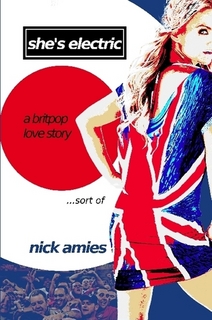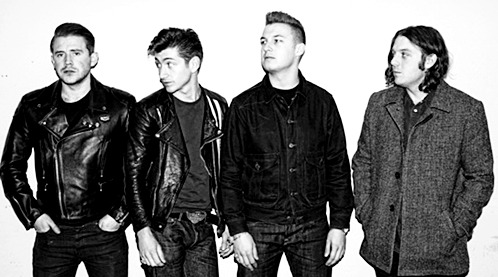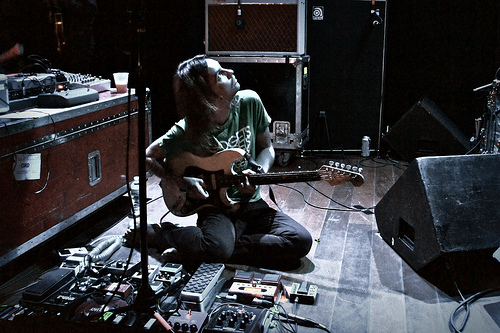In a departure from the usual Tales From Down the Front articles, I am posting an interview I gave to the US music site Puluche.com about the release of my second novel She’s Electric.
Nick Amies is a journalist and author based in Brussels who writes for publications such as The New York Times, The Economist and Red Bulletin magazine and is also a senior contributing writer for Puluche. While his freelance work ranges from international politics to architecture, his main passion is music. As well as his magazine work, Nick has written two novels, each set in an important period of British pop culture. Here he talks to Puluche about She’s Electric, his Britpop-era love story and ode to excess.
 Puluche: Firstly, congratulations on She’s Electric. I found it to be an extremely interesting read. It certainly is a multi-faceted love story with a sex, drugs and rock and roll backdrop, but within a “Cool Britannia” culture which many might not know about. How does your book relate to international audiences when it’s such a Brit-focused topic?
Puluche: Firstly, congratulations on She’s Electric. I found it to be an extremely interesting read. It certainly is a multi-faceted love story with a sex, drugs and rock and roll backdrop, but within a “Cool Britannia” culture which many might not know about. How does your book relate to international audiences when it’s such a Brit-focused topic?
Nick Amies: I think the emotional themes running through the book – love, loss, desperation, insecurity – are universal. When we first meet Danny, the narrator of the story, he’s a young man coming out of a long-term relationship into a world he doesn’t really understand. He’s been one half of a high school love affair as long as he can remember and now he’s on his own. He’s hurt, lonely and angry due to the break-up but also confused and lost because he doesn’t know who or what he’s supposed to be. I think that wherever you’re from, you can relate to feelings like that and it’s part of the human condition to question the reasons for our existence and what it’s all supposed to mean. As for the cultural setting, again I feel that while it’s specifically British, anyone who has ever had their life changed by music or have bought into a particular scene wholesale will identify with the characters. The music is not just a soundtrack to their lives but a way of life in itself. It comes with an identity, a fashion and a sense of belonging. Anyone who has ever been a fan of a band will know what that means. Plus being a music fan, I believe, is essentially being part of a global community. We may have different tastes but the emotions that music elicits are built into our DNA. She’s Electric is set in the Britpop era but it could have been set anywhere at any time where a musical phenomenon has moved a generation of young people.
In that case, why set the book specifically in the Britpop era?
Firstly, I followed the old advice of writing about what you know. I lived through this period and experienced a lot of things I wanted to document. Secondly, the Britpop era is extremely well suited as a setting for a coming-of-age story with all the insecurities which come with that. It was a uniquely superficial period and as such it was the best and worst time to suffer from an identity crisis, which is essentially what each of the main characters in my book are going through. On the one hand, the movement itself and its association with a new permissiveness which openly tolerated bad behavior, casual sex and substance abuse came with a blueprint. If you weren’t sure who you wanted to be, you just did what everybody else did. There was an attitude, a way of dressing, a way of behaving that was connected with the whole idea of what it meant to be young and British at the time. But on the other hand, if you were really searching for something, buying into this could really drag you further away from yourself. This is the situation facing the guys in the book. They have whole-heartedly embraced Britpop and Lad culture but, as time moves on, they realize that there is little substance behind it and that the void they have in their lives is still there behind the sex, drugs and rock’n’roll.
Is it a very personal story then? Perhaps a thinly-veiled autobiography?
I would never admit that even if it were true! What I will say is that the characters are fictitious but the experiences are very loosely based on those I and my friends were part of but everything is exaggerated for narrative purposes. Of course the cultural reference points detailed in the book such as the massive Oasis gigs at Knebworth in 1996, the 1995 Glastonbury festival and the 1997 General Election in the UK are all documented historical events. The emotional turmoil and search for identity are all written from a personal viewpoint but don’t get the idea that we were all suffering some kind of existential angst! It was the best time to be young and the most concentrated period of partying that I’ve ever lived through so we were hardly crying into our beers every night, wailing about how hard our lives were. It was a lot of fun. I think that comes across in the book. Danny and his friends live it large and enjoy every excessive minute but at some point they realize that there’s more to life than picking up a different girl every night and waking up with self-induced memory loss and that’s when the internal struggles begin.
What are the subtexts and messages in the book? What did you set out to say with it beyond reminiscing about a great time in music?
The book moves from the present to the past and back again with flashbacks from the Britpop era used to illustrate certain themes or show contrasts to the lives the main characters are leading in the present day. All of them are struggling with different aspects of their lives as adults with responsibilities and their reunion back on their old stomping ground emphasises how much things have changed. Danny is the last one to really give up on the old life and is using the reunion to see if returning to his old ways is a viable option, despite having a partner and child at home. His identity crisis has gone on the longest. I suppose there’s a message here about the risks of trying to recapture former glories or trying to relive the past at the risk of your future. I also wanted to point out that even though we get older, things don’t always get easier if you’re not prepared to leave history behind. We can only grow by letting go, which doesn’t mean we have to forget or deny the past. The sections dealing with Britpop are clearly a celebration of that time with their depictions of all the fun that was had but as that timeline moves on to 1997 it shows that the façade was beginning to slip and the party was clearly coming to an end, something the guys address with hindsight in the present day sections of the book. In short, I wanted to show that youth cultures are not built to last, much like youth itself, but you should live them to the full while they’re there just as you should embrace your youth and not pine for it when it’s gone.
 Why was Britpop so important to British culture?
Why was Britpop so important to British culture?
Youth and popular culture movements tend to rise as a reaction to the socio-political climate of the time. Before Britpop, we’d had a reaction to the years of oppressive conservatism which had become entrenched in the UK under Prime Minister Margaret Thatcher. This reaction gave birth to acid house and the Madchester music scene. Driven by the ecstasy explosion, these movements provided an escape route from the poverty and hopelessness that many parts of Britain were suffering from at the end of the 1980s. When that phase passed, British music retreated and US grunge flooded in. Britpop was a reaction to that as much as anything else. People like Blur’s Damon Albarn and Noel Gallagher of Oasis said that their bands’ early Britpop output was a direct riposte to the nihilism of grunge and an attempt to reverse the flood of US culture swamping the UK. So, Britpop was important in the way that it gave the country something to be proud of again and made it okay to be patriotic. Britpop got an extra boost when Tony Blair and the Labour Party finally ended 18 years of conservative rule in 1997. Suddenly it was like the heavy curtains were drawn back to reveal a new land of hope and opportunity stretching into the distance. When things like that happen in my country, we Brits tend to go a bit mad and make the most of it without really thinking about the consequences. But before it was all revealed to be a false dawn and that we’d actually been manipulated into thinking things would be truly different, Blair’s labeling of all things cultural with the “Cool Britannia” tag revitalized everything: music, art, literature and film. Even though it turned out to be a cynical marketing plan of the government’s making, the idea to tie it all together and brand it was an inspired one. It was an identity we could all get behind and one which could be sold abroad. Britain was the centre of attention during that time and I think the music, fashion and attitude which came out of that time began to influence a lot of other cultures.
And what about the music which was at the heart of it all?
The success of the big bands such as Oasis, Blur and Pulp for example inspired many others to make music with varying degrees of success and quality so to be a fan of the genre at that time was to be spoilt for choice. It was a great and productive time for British music and it also exported well. The Europeans instantly understood it and quickly grew to love it, the Japanese went crazy for it immediately and even the US succumbed to a certain degree. Its popularity in the countries which embraced it can still be seen today in the way audiences welcome back the legends and react to British bands in general as a result of that Britpop Invasion.
It’s also worth remembering that Britpop happened at a time before the internet exploded. Oasis sold over eight million copies of their debut album and followed that up by selling over 22 million copies of (What’s the Story) Morning Glory? without the help of Twitter, YouTube or online marketing campaigns. This was an age before the digital revolution so all those sales were actual CDs, records and cassette tapes. There wasn’t any downloading going on – legal or otherwise. So in that respect, Britpop still represents the zenith of the British music industry before it imploded. It is a high watermark that will never be reached again.
 Is this era still relevant today?
Is this era still relevant today?
It’s relevant in the way that punk is still relevant or the Sixties are still relevant. We are where we are musically in the UK because of Britpop. And Britpop couldn’t have happened if bands hadn’t heard the Sex Pistols or had never listened to their parents’ Beatles records. It’s a signpost on the road of Britain’s musical progress, whether people like that or not. If there had been no Stone Roses, there would have been no Oasis. No Oasis, no Arctic Monkeys and so on. So as a legacy with a continuing influence, yes it’s relevant. As a reference point on the quest of knowledge about Britain’s musical heritage, it’s relevant. But most importantly, it’s relevant in the lives of all those who love the music that came out of that era. For us, it’s as relevant now as it was then because it is such a huge part of our lives. That’s why in She’s Electric, Danny and his friends continue to celebrate those days even as middle age creeps up on them. Their lives have gone separate, very different ways but they will always have those crazy days when their friendships were formed. For the Britpop generation, it will always be relevant.
What is the true current status of the Britpop genre? The remaining bands that consider themselves a part of this movement, do they still represent the genre well compared to the originals like Blur, Suede and eventually others such as Oasis?
When the party ended, there were a lot of casualties. No-one escaped unharmed and I think that can be heard in the material that the original bands put out after Britpop came to a close. If you listen to Blur or 13 they are polar opposites of The Great Escape and you can’t compare the cocaine bluster of Be Here Now-era Oasis to the washed-out comedown of Standing on the Shoulder of Giants. So whatever Britpop was musically, it stopped existing soon afterwards. But even at the height of the movement it was a very contentious thing to say that one band or another sounded “Britpop”. There was never really one style. It was more of an attitude than a sound. When that attitude became more introspective, Britpop ceased to exist. There may be bands around now which get labeled Britpop but that’s just lazy. They can’t be Britpop because there is no such thing. That particular zeitgeist – every strand of cultural DNA from which Britpop was constructed – is history. It can never be repeated or cloned.
Knowing you as a music reviewer as well, one that can be quite critical, you recently rated Arctic Monkeys latest album AM as a perfect release. Such new releases are sadly few and far between in modern music compared to previous decades. What are many of today’s bands missing compared to a release like AM where they just get it?
It’s easy to point the finger at The Man but that doesn’t change the fact that The Man has a lot to answer for in this respect. There are just too few risk takers in the music business these days and not enough labels who are confident and savvy enough to let their acts experiment. I have a lot of respect for Domino for letting Arctic Monkeys go their own way. They could have forced them to stick to the tried and tested formula of the early days but they gave them space to evolve. They could have panicked after Humbug saw the band suffer what was essentially the first bit of backlash but they let them work it out themselves and move on to great effect. I wrote in my AM review that freedom and confidence bring their own reward and for great music to be made there has to be less emphasis on the bottom line and shifting units. Bands have to be shown love and trust, not balance sheets. Reducing the number of accountants and employing more people with a passion for music would be a start.
In your opinion, is rock music in a continuing period decline?
I wouldn’t say it’s in a continuing period of decline but I would say that it is in one of the longest periodical downswings for some time. We haven’t really seen a movement crash into the collective consciousness and change the musical landscape for a few years now. We seem to be relying on individual bands to innovate and excite rather than expecting a wave to sweep in with all the added extras like the fashion, the attitude and the message to compliment the music. Usually these things grow from a scene in a particular city. I’ve been pinning my hopes on the Perth underground for a while now, with Tame Impala, Pond and others coming from this alternative community on the Australian west coast but I think there should have been more of a collective impact made by now. Perhaps growing a local scene from Down Under into an international phenomenon is harder than if you are in New York. I don’t know. Perhaps the general problem is that the opportunities previously enjoyed by those being nurtured in the traditional breeding grounds are shrinking. The question then arises about funding and support for small venues and you’re then into a political debate. But who can say for sure? Maybe it is all crap and we’ve already been condemned to an eternity of rubbish but we haven’t yet realized it. I sincerely hope not.
She’s Electric is available in paperback and Kindle versions on all Amazon’s international sites.
This interview first appeared on Puluche.com















